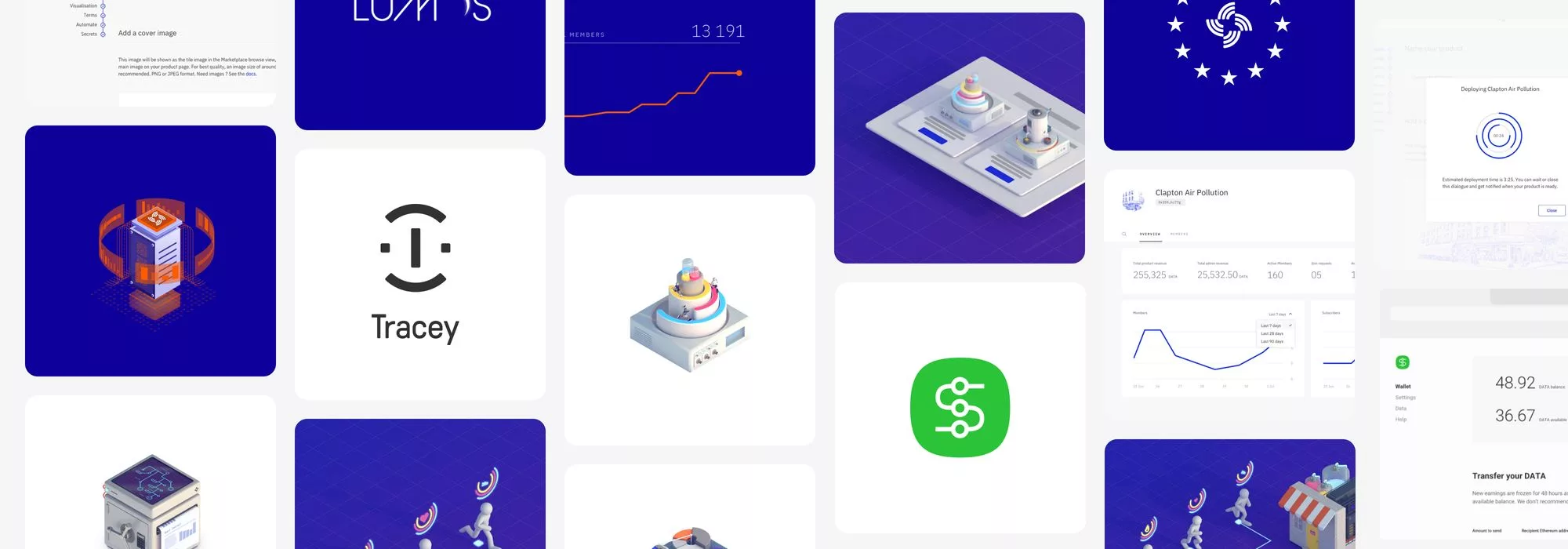First of all, what is a Data Union? A Data Union is a framework that allows people to easily bundle and sell their real-time data and earn revenue. On its own, our data does not hold much value, but when combined in a Data Union, it aggregates into an attractive product for buyers to extract insights. This is crowdselling, and has the potential to generate unique data sets by incentivising trade directly from the data producers.
Table of Contents
- The problem Data Unions solve
- 2021 Data monetization predictions from the experts
- How do you think Data Unions will take shape in the next year?
- How will Data Unions take hold in the next 3 years?
- What’s your prediction on how global data policy will inform enterprise on data portability?
- What’s your prediction on how global data policy will inform enterprise on data ownership?
- How will global data policy inform enterprise on data licensing and monetization?
- What’s the worst case scenario of how data monetization takes shape in the future?
- What’s your blue sky vision for what happens with data policy? And how do you imagine the impact this scenario has on culture (people, government, and companies) in the next 3–5 years?
The problem Data Unions solve
Most of the data generated by smart devices is stored in silos by the companies who provide them. By making this information more accessible through trade, and incentivising the creation of new data points, an individual data economy can be stimulated and technologies such as those imagined in IoT can be further realized.
Basically, data unions provide the possibility for users to receive the value of the transfer of their information, thereby distributing value directly to the source. This differs hugely from what we see today, which is data value extraction, oftentimes without consent of the consumer.
2021 Data monetization predictions from the experts
Streamr aims to change all of that, which is why we’ve gathered some of the world’s experts to get their predictions on the future of data monetization.
Our experts are all part of the Streamr Data Union Advisory Board, which is composed of policy makers, academics, subject matter experts and political activists.
How do you think Data Unions will take shape in the next year?
Frankly, the ‘Data Union’ concept hasn’t taken off yet. But, that’s quickly changing and according to our experts, we’ll see more journalists and data professionals picking up the phrase in the next year, which will help to popularize the idea. For now, based on Google search terms, Data Unions, labor unions, and trade unions show a similar stable trajectory in terms of how many people are searching for information on these concepts. But according to our experts, the mindshare of people knowing what Data Unions are or at least having an awareness of the concept will significantly change in 2021.
“The next year needs to be about raising awareness of the need for these new institutions, not just amongst the data aware but in the wider population.” — Alex Craven, founder of The Data City
“This is the year folks are starting to hear about Data Unions. The first attempts at building useful ones are starting to take place.” — Brian Zisk, parallel entrepreneur and Chia Network advisor
“Awareness will increase about the value of collective bargaining around data, and we will see different groups organizing to make demands for change in how data is valued and who gets compensated.” — Peter Gerard, filmmaker and a leading expert in film distribution
Maria Savona, Professor of Economics at the University of Sussex, believes that digital rights activists must be aligned for data unions to take off, with the following observations:
“I think Data Unions will take off conditional to framing a campaign that touches upon economic justice, agency over data, instead of data ownership. Digital rights activists tend to be against data monetisation so an argument must be won on the digital rights side.”
Matt Prewitt, President of the RadicalxChange foundation, on the other hand thinks there are too many information silos, beyond the intellectual elite and into the mind awareness of most people:
“In the next year, the issue will probably enter the mainstream of elite conversation but we must still do a lot of popular consciousness-raising. Most people are just starting to become more aware of the pervasiveness of data and their powerlessness over it.”
How will Data Unions take hold in the next 3 years?
Most of our experts believe that the world will fundamentally be changed three years from now and Data Unions will be part of a larger move toward more equitable value distribution throughout the economy, especially the digital economy.
“In three years, there will be several valuable models of Data Union feeds successfully in use.” — Brian Zisk, parallel entrepreneur and Chia Network advisor
“Within three years I anticipate a world in which Data Unions are beginning to return money to people for creating and sharing data.” — Peter Gerard, filmmaker and a leading expert in film distribution
“Data Unions should be seeing large scale adoption and finding increasing influence over the personal data debate and technology landscape.” — Alex Craven, founder of The Data City
“In the long term, I think Data Unions need to carve out their own position in the landscape of data trusts, data stewards, and other legal figures, by branding itself appropriately, so that people do not get confused.” — Maria Savona, Professor of Economics at the University of Sussex
“At some point in the next two years, technology will allow us to deliver tangible value for the individual and at that point the floodgates will open. Late adopters will join and in three years participating in a Data Union will be normal and possibly mandated in some jurisdictions. Unions will be for instance certified, much like other data infrastructures, and people will pick theirs much like they pick network or cloud storage providers. The economic return for data owners will be the driver. The best unions will implement services to create added-value data assets (data curation and harmonization for instance) to multiply the value of their offer and in turn returning more “data dividends” to their subscribers. Also key will be their ability to negotiate with buyers on behalf of their members.”
“Hard to predict the form it takes, but Data Unions and the legal landscape around them will become central to political and economic life.” — Matt Prewitt, President of the RadicalxChange foundation
What’s your prediction on how global data policy will inform enterprise on data portability?
“More laws will be passed which will mostly muck things up, but it will be easier to take your data with you.” — Brian Zisk, parallel entrepreneur and Chia Network advisor
“There’s an inherent conflict between data portability and existing approaches to data privacy. Policies that encourage data portability are going to have to grapple with the privacy laws that make data portability more challenging and that have entrenched the power of large internet companies. Data portability is essential to competition and innovation, but governments have traditionally reacted to privacy threats with hastily or poorly written laws that can misunderstand the nature of technology and usually end up limiting scope for portability. Due to the uneven and conflicting progress between privacy and portability and the slow process for policy implementation, I expect it will take years before data portability becomes commonplace.” — Peter Gerard, filmmaker and a leading expert in film distribution
“We need to find a better way to manage the relationship between individuals, their data and organisations that use this data. The hope that this passes from being a battle to pull back control to the individual into a more progressive and constructive partnership with industry and government to create equity in the relationship that benefits all.” — Alex Craven, founder of The Data City
“Data portability is already in the GDPR and hopefully will be copied across non-EU countries. Data ownership is regulated only at the level of a firms’ database rather than personal data. This can be a useful rhetorical device to convince data policy makers that data subjects can monetise their own data, i.e. only showing regulators the potential inconsistencies of their policy objectives.” — Maria Savona, Professor of Economics at the University of Sussex
“Portability and ownership are established principles, at least in Europe, still more in theory than practice, but the course seems to be set. The big elephant in the room are licensing and monetization. Interests and stakeholders are far from aligned around these issues and policies are much needed. Hopefully the US will follow Europe’s lead in tackling head on these big decisions.” — Davide Zaccagnini, informatics researcher at MIT.
“As Yogi Berra once said, predictions are hard, especially about the future.” — Matt Prewitt, President of the RadicalxChange foundation
What’s your prediction on how global data policy will inform enterprise on data ownership?
“YOYOD — You own your own data. Doesn’t mean others don’t as well, but it’ll become more obvious and horrifying what each of us are sharing,” — Brian Zisk, parallel entrepreneur and Chia Network advisor
“Many massively successful internet companies have increased their value by convincing people to voluntarily create and give away data to the companies. Examples include Amazon (through reviews, ratings, lists, affiliate programs, IMDB metadata, etc.), Google (through analytics, maps and places data, search feedback, GPS-tracking, training of image recognition through recaptcha, etc.), Facebook (social graph, interests, facial recognition training, etc.), Yelp (places and reviews), Foursquare (places and GPS-tracking). Governments need to recognize that companies reselling or otherwise monetizing user-generated data — that people gave them for free — are both inhibiting competition and undervaluing the individual contributions people have made (these companies often think it is the company’s achievement that they convinced so many people to crowd-source their data rather than appropriately recognizing that the achievement belongs to the people). I think that this is the biggest opportunity for change and where policy can disrupt the value chain most meaningfully.” — Peter Gerard, filmmaker and a leading expert in film distribution
How will global data policy inform enterprise on data licensing and monetization?
“There will be a dual track where people are knowledgeable about and capture their own data and do with it as they please, contributing it to a Data Union for example or just being more conscious of what data trail they create, and the more common model where folks largely won’t care.” — Brian Zisk, parallel entrepreneur and Chia Network advisor
“While data licensing can be a lucrative opportunity in some sectors, it seems to me that the most wealthy internet companies monetize their data more effectively within their own platforms. Thus I think the most meaningful changes to monetization from a Data Union perspective, will need to come from external transparency regarding a company’s data usage and compensating users based on that transparency. There is an opportunity to require open standards for how the data is tracked and accounted for, and this open standard could be a decentralized system like Streamr’s.” — Peter Gerard, filmmaker and a leading expert in film distribution
What’s the worst case scenario of how data monetization takes shape in the future?
“Laws could be passed which give data rights solely to the services.” — Brian Zisk, parallel entrepreneur and Chia Network advisor
“Worst case is that policy developments continue to entrench the biggest players at the expense of competition and equity.” — Peter Gerard, filmmaker and a leading expert in film distribution
“More of the status quo.” — Alex Craven, founder of The Data City
“The ones vividly described by Valentina Pavel here. Overall, I think there is a lot to do to define arguments, campaigning and aiming at a global case, rather than a EU or a US centred one. For instance, what about trying to look at what happens in Taiwan?” — Maria Savona, Professor of Economics at the University of Sussex
“Data Unions fail to deliver value to their subscribers. Both technological and market pressure can push things in that direction. Data Unions become another “Napster story” and power is once again centralized in some new kind of structure. That’s why a Data Unions strategy has to strive, first and foremost to deliver actual, measurable value to the people.” — Davide Zaccagnini, informatics researcher at MIT.
“Data Unions acquire a reputation as an unworkable or failed proposition, and we continue to operate in an economy in which the value of information flows to the most powerful aggregators.” — Matt Prewitt, President of the RadicalxChange foundation
What’s your blue sky vision for what happens with data policy? And how do you imagine the impact this scenario has on culture (people, government, and companies) in the next 3–5 years?
“It should be clear that everyone has rights to the data they generate.” — Brian Zisk, parallel entrepreneur and Chia Network advisor
“The best case vision for me would be legislation for a change in terms & conditions to introduce a citizen centric contract, where a service provider contract is a two way document where in addition to your acceptance of their terms, the provider accepts your personal data terms and conditions. The role of Data Unions would be to act as the institution facilitating and managing that contract. Perhaps the law would make Data Union membership mandatory in this circumstance.” — Alex Craven, founder of The Data City
“As user-centric policies get incorporated in more and more systems, I can enforce in one click my right to carry, delete or share my data. I know who is using my information, when and for what purpose through a simple dashboard on my phone. I can seek the best Data Unions much like I seek companies whose mission and practices align with my values, while looking for the best bargain. I can connect with people who share my values and move strategically our aggregated data to influence corporations and other institutions.” — Davide Zaccagnini, informatics researcher at MIT.
“Data Unions become a major locus of economic and political power, interacting symbiotically with a healthy digital economy in which diverse interests are more-or-less well represented.” — Matt Prewitt, President of the RadicalxChange foundation











